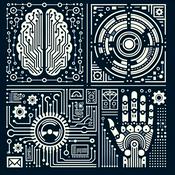Emerging Technology Trends: AI, Robotics & Digital Innovation
Inception Point Ai

Najnowszy odcinek
236 odcinków
Robots Just Got Cheap and AI Workers Are Taking Over: The 2026 Tech Revolution You Need to Know About
18.02.2026 | 2 min.This is you Emerging Technology Trends: AI, Robotics & Digital Innovation podcast.
As we dive into emerging technology trends on this crisp February morning in 2026, agentic artificial intelligence and humanoid robotics lead the charge, transforming industries at breakneck speed. According to the Innovation Mode blog, agentic AI now acts as autonomous digital workers, reasoning, planning, and executing tasks like browsing the web or querying databases, compressing innovation cycles from months to days. Humanoid robots from Tesla's Optimus, Figure AI, and Hyundai's Atlas are scaling production, with manufacturing costs dropping 40 percent from 2023 to 2024, paving the way for factory and home use by the late 2020s.
MarketsandMarkets reports the global AI robots market surging from 6.11 billion dollars in 2025 to 33.39 billion by 2030 at a 40.4 percent compound annual growth rate, driven by machine learning in manufacturing, healthcare, and logistics, with Asia Pacific claiming 41 percent share. Recent news underscores this: Nvidia's Jensen Huang declared the ChatGPT moment for physical AI at CES, while Hyundai unveiled Atlas for production lines, per Manufacturing Dive. Global Market Insights notes AI-powered industrial robots hitting 17.9 billion dollars in 2026, growing to 33.3 billion by 2035.
Quantum computing shifts from prototypes to utility, solving complex problems in minutes, while blockchain and Internet of Things integrate with AI for secure, edge-based IoT networks. Cross-industry trends see AI reshaping automotive and healthcare, with brain-computer interfaces targeting a 6 billion dollar market by 2032. Investments pour in, with Gartner forecasting 2.52 trillion dollars in worldwide AI spending this year.
Yet challenges loom: ethical AI deployment demands verifiable outputs to curb hallucinations, and regulations must balance innovation with privacy. Solutions include hybrid neural interfaces and agile ecosystems.
Listeners, validate opportunities via AI experimentation, build cross-disciplinary teams, and partner strategically to capitalize. These trends predict massive disruption, birthing new markets through the 2030s.
Thank you for tuning in. Come back next week for more, and this has been a Quiet Please production. For me, check out Quiet Please Dot A I.
For more http://www.quietplease.ai
Get the best deals https://amzn.to/3ODvOta
This content was created in partnership and with the help of Artificial Intelligence AIRobots Are Taking Over and Jensen Huang Says the Revolution Just Got Real - Here's Where the Money's Going
17.02.2026 | 3 min.This is you Emerging Technology Trends: AI, Robotics & Digital Innovation podcast.
The robotics and artificial intelligence revolution has reached an inflection point. Nvidia's Jensen Huang declared the ChatGPT moment for physical artificial intelligence has arrived, and the market data confirms it. According to Markets and Markets analysis, the global artificial intelligence robots market is projected to grow from six point one one billion dollars in twenty twenty five to thirty three point three nine billion dollars by twenty thirty, representing a compound annual growth rate of forty point four percent.
What's driving this explosive growth? Physical artificial intelligence breakthroughs are transitioning robots from laboratory prototypes to commercial deployment across manufacturing, healthcare, and logistics. The International Federation of Robotics reported five hundred forty two thousand industrial robot installations during twenty twenty four, with projections topping seven hundred thousand units annually by twenty twenty eight. Asia Pacific leads the charge, capturing forty one percent of the global market share, driven by rapid industrial automation in China, Japan, and South Korea.
Service robots are emerging as the fastest growing segment, with a projected compound annual growth rate of forty point seven percent through twenty thirty. The personal assistance and caregiving sector alone is expected to hold twenty two percent market share by twenty thirty. Meanwhile, humanoid robots are transitioning from experimental to practical deployment. Hyundai Motor Group recently debuted its Atlas humanoid robot for production settings with plans for gradual deployment across operations. BMW integrates autonomous vehicle technology into factory workflows, enabling newly assembled cars to drive themselves from assembly lines through testing without human intervention.
The convergence of agentic artificial intelligence with physical robotics represents the next frontier. According to Deloitte research, nearly three in four companies plan to deploy agentic artificial intelligence within two years. These autonomous digital workers compress innovation cycles from months to days, fundamentally reshaping how organizations operate. Cost-effective sensor technologies and artificial intelligence agents enable manufacturers to autonomously monitor equipment, anticipate maintenance needs, and manage supply chains with unprecedented efficiency.
Investment opportunities abound as robotics simulation software spending is forecast to double from seven hundred fourteen million dollars in twenty twenty five to one point four billion dollars by twenty thirty. Organizations must prepare for integration challenges involving technical implementation, workforce adaptation, and cybersecurity considerations.
The transition from digital to physical artificial intelligence represents one of the most transformative technological shifts of our generation. Companies investing now in robotics infrastructure, artificial intelligence talent, and digital transformation initiatives will capture significant competitive advantages.
Thank you for tuning in. Join us next week for more insights on emerging technology trends. This has been a Quiet Please production. For more, check out Quiet Please dot A I.
For more http://www.quietplease.ai
Get the best deals https://amzn.to/3ODvOta
This content was created in partnership and with the help of Artificial Intelligence AI- This is you Emerging Technology Trends: AI, Robotics & Digital Innovation podcast.
As we step into this pivotal week of 2026, breakthroughs in physical artificial intelligence are propelling robotics into everyday reality. Nvidia CEO Jensen Huang declared at CES earlier this year that the ChatGPT moment for physical AI has arrived, with Hyundai Motor Group unveiling its Atlas humanoid robot for manufacturing deployment. According to Fortune Business Insights, the global artificial intelligence robots market will surge from 7.46 billion dollars in 2026 to 60.68 billion by 2034, growing at a compound annual rate of 30 percent, led by North America at 37 percent market share.
Cross-industry innovation accelerates as agentic AI agents, powered by large language models, team up with Internet of Things sensors for autonomous supply chain management and predictive maintenance. Deloitte reports nearly three in four companies plan agentic AI rollout within two years, while manufacturing dominates with 40 percent adoption for efficiency gains. Quantum computing edges closer, promising quantum robotics for ultra-fast decision-making, per Deloitte analysis, alongside blockchain for secure IoT data flows.
Investment patterns show explosive funding, with the International Federation of Robotics noting 542 thousand industrial robot installs in 2024, eyeing 700 thousand annually by 2028. Asia Pacific leads growth at 29.5 percent compound annual rate, fueled by China's smart factories.
Yet regulatory hurdles loom, demanding ethical guidelines for humanoid dexterity and job displacement, alongside integration challenges like onboard neural processing for real-time autonomy. Solutions emerge through human-robot collaboration, as Omdia forecasts flexible cobot environments.
Looking ahead, these trends predict workforce transformation, with robots handling complex tasks in healthcare, logistics, and beyond, compressing innovation cycles from months to days.
Listeners, explore AI robotics investments now and pilot IoT agents in your operations for quick wins. Thank you for tuning in. Come back next week for more. This has been a Quiet Please production, and for me, check out Quiet Please Dot A I.
For more http://www.quietplease.ai
Get the best deals https://amzn.to/3ODvOta
This content was created in partnership and with the help of Artificial Intelligence AI Robots Are Coming for Your Job and Your Heart: The Wild Race to Build Our AI Overlords
15.02.2026 | 2 min.This is you Emerging Technology Trends: AI, Robotics & Digital Innovation podcast.
Agentic artificial intelligence and humanoid robots are leading the charge in emerging technology trends, transforming industries from manufacturing to healthcare. According to The Innovation Mode blog, agentic AI now reasons, plans, and executes tasks autonomously, compressing innovation cycles from months to days, while humanoid robots from Tesla's Optimus and Figure AI scale toward factory and home use, with costs dropping 40 percent from 2023 to 2024. MarketsandMarkets reports the global AI robots market will surge from 6.11 billion dollars in 2025 to 33.39 billion by 2030 at a 40.4 percent compound annual growth rate, driven by machine learning in service robots.
Recent news underscores this momentum: Nvidia's Jensen Huang declared at CES the ChatGPT moment for physical AI has arrived, fueling commercial deployments, per Manufacturing Dive. Hyundai Motor Group unveiled its Atlas humanoid for production lines, and the International Federation of Robotics noted 542,076 industrial robot installs in 2024, with Asia claiming 74 percent.
Cross-industry innovations blend AI with quantum computing for faster problem-solving, blockchain for secure IoT data, and robotics for logistics. Deloitte predicts physical AI will evolve to mainstream humanoid adoption in human spaces. Investments pour in, with 85 percent of advisors eyeing robotics per ETF Trends, and Gartner forecasting 2.52 trillion dollars in worldwide AI spending this year.
Regulatory hurdles demand ethical AI governance to curb biases, while integration challenges like verifiable outputs are tackled via multi-component pipelines. Future impacts include workforce shifts, with practical takeaways: validate opportunities rapidly through AI experimentation, build cross-disciplinary teams, and partner for ecosystems.
Listeners, stay ahead by upskilling in AI-robotics interfaces and exploring investment in Asia-Pacific's 41 percent market share. Thank you for tuning in—come back next week for more. This has been a Quiet Please production, and for me, check out Quiet Please Dot A I.
For more http://www.quietplease.ai
Get the best deals https://amzn.to/3ODvOta
This content was created in partnership and with the help of Artificial Intelligence AI- This is you Emerging Technology Trends: AI, Robotics & Digital Innovation podcast.
As we step into this new era of innovation on February 14, 2026, artificial intelligence, robotics, and digital breakthroughs are reshaping industries at an unprecedented pace. The global artificial intelligence robots market, valued at 7.46 billion dollars this year according to Fortune Business Insights, is projected to surge to 60.68 billion dollars by 2034, growing at a compound annual rate of 30 percent, with manufacturing capturing 40.48 percent of demand driven by automation needs.
Agentic AI, blending analytical processing for pattern detection and generative capabilities for self-evolving tasks, is the top robotics trend, as outlined by the International Federation of Robotics. This empowers robots to anticipate factory failures or optimize logistics paths independently, while the convergence of information technology and operational technology enables versatile, real-time adaptability in smart factories. Quantum robotics emerges on the horizon, promising supercharged decision-making through quantum algorithms, per Deloitte's Tech Trends 2026 report.
Cross-industry waves include BMW deploying AI-driven autonomous vehicles in factories for seamless assembly-to-testing transport, and physical AI robots expanding from warehouses to surgery and urban navigation. Investment flows heavily into North America at 2.78 billion dollars this year, Asia Pacific racing ahead with a 29.50 percent growth rate fueled by China's 0.72 billion dollar market, and Europe emphasizing research amid regulations.
Ethical concerns around job displacement and data privacy demand balanced regulations, while integration hurdles like scaling production are easing with falling costs. Recent news highlights NVIDIA and Boston Dynamics leading humanoid robot pilots in logistics, and IBM predicting a shift to physical AI over pure language models.
Looking ahead, these technologies predict transformative impacts: safer healthcare, efficient supply chains, and IoT-blockchain hybrids for secure data flows by 2030. For businesses, practical takeaways include piloting agentic AI for automation pilots, investing in IT-operational technology training, and partnering with ethical AI firms to navigate regulations.
Embrace these shifts to stay ahead—start with a robotics audit today.
Thank you for tuning in, listeners. Come back next week for more. This has been a Quiet Please production, and for me, check out Quiet Please Dot A I.
For more http://www.quietplease.ai
Get the best deals https://amzn.to/3ODvOta
This content was created in partnership and with the help of Artificial Intelligence AI
Więcej Wiadomości podcastów
Trendy w podcaście Wiadomości
O Emerging Technology Trends: AI, Robotics & Digital Innovation
Explore the future of technology with "Emerging Technology Trends: AI, Robotics & Digital Innovation." Updated daily, this podcast offers the latest insights and analysis on cutting-edge advancements in artificial intelligence, robotics, and digital transformation. Stay ahead in the fast-paced tech world by tuning in to expert interviews, industry news, and deep dives into groundbreaking innovations revolutionizing our lives. Perfect for tech enthusiasts, professionals, and anyone eager to keep up with the ever-evolving landscape of technology.For more info go to https://www.quietplease.aiCheck out these deals https://amzn.to/48MZPjs
Strona internetowa podcastuSłuchaj Emerging Technology Trends: AI, Robotics & Digital Innovation, OSW - Ośrodek Studiów Wschodnich i wielu innych podcastów z całego świata dzięki aplikacji radio.pl

Uzyskaj bezpłatną aplikację radio.pl
- Stacje i podcasty do zakładek
- Strumieniuj przez Wi-Fi lub Bluetooth
- Obsługuje Carplay & Android Auto
- Jeszcze więcej funkcjonalności
Uzyskaj bezpłatną aplikację radio.pl
- Stacje i podcasty do zakładek
- Strumieniuj przez Wi-Fi lub Bluetooth
- Obsługuje Carplay & Android Auto
- Jeszcze więcej funkcjonalności


Emerging Technology Trends: AI, Robotics & Digital Innovation
Zeskanuj kod,
pobierz aplikację,
zacznij słuchać.
pobierz aplikację,
zacznij słuchać.






































